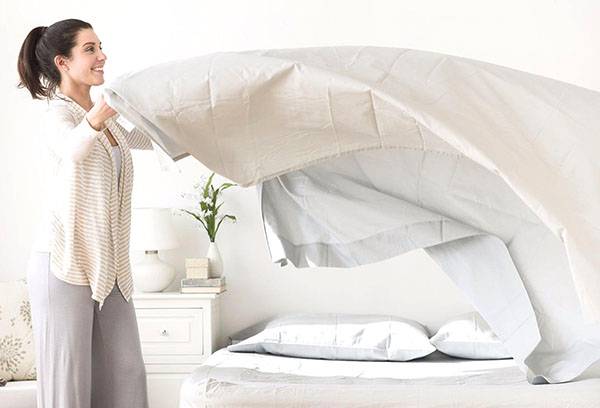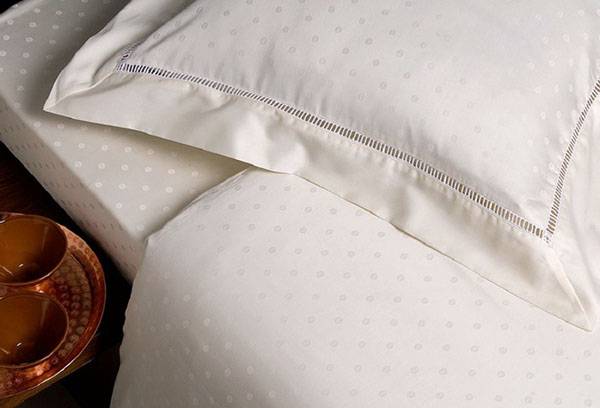How often do I need to change bedding and what is the risk of a rare change?
Surely there was a whole chapter in the book on home economics devoted to how often to change bedding at home: exceed the recommended period at least for a day - and you are no longer an exemplary guardian of the hearth. But how are you now? You will be surprised, but with a high degree of probability you wash the sheets, duvet covers and pillowcases a sufficient number of times: be it once a week or a month.
How often is linen changed?
How is this even possible? Is there really no specific figure to be guided by? Why so. Ask the scientists, and they will answer that the linen should be changed every 7, well, a maximum of 10 days. At the same time, a more rare change of linen is shrouded in such a haze of frightening tales that you willy-nilly want to change the kit immediately.
So, what is the reason for such a frequent change of linen?
- A person sleeps about 8 hours a day. He wears about the same amount of clothing at work or school. Wearing the same sweatshirt for 2 weeks in a row - beyond the bounds of public decency, which means that linen should be changed as often.
- Dead cells accumulate on the bed, which can attract bugs, the presence of which you will absolutely not be happy.
- The fat that is secreted by the sebaceous glands is becoming increasingly difficult to wash off over time: even White is not helping to remove old yellow spots on pillows.
- In a dream, a person sweats, giving a total of up to a liter of fluid per night. Who wants to sleep on a sweat-soaked sheet or pillowcase?
- Sweat, fat, and dead cells cause an unpleasant odor that can prevent you from enjoying a healthy, quality sleep. Still, sleeping is easier in a fresh crib.
- The dirt that accumulates on sheets and duvet covers promotes the growth of bacteria and fungi, which are not so easy to remove by washing.
- Dust and dirt on bedding can exacerbate some chronic respiratory illnesses, such as asthma.
By the way
The hotter the water during washing, the more germs and bacteria will die. So, in most machines the “cotton” mode at 90 ° C is provided specifically for washing clothes, and not so long ago, sheets and pillowcases were generally boiled in large pots.
It sounds like it’s time to drop everything and urgently start washing the clothes that you put on inappropriately long 11 days ago. Then why - and here you will probably recognize yourself - the minimum number of people is not too lazy to change sets weekly, but most delay the washing up to two weeks, and sometimes even a month?
How often do you need to change underwear in reality?
Have you ever heard that a person falls ill with an incurable disease from not washing clothes for too long? Unlikely. Some individuals - what to conceal, mostly bachelors - manage to use the same kit for months and still feel great! So how often do you need to change bedding at home? Unfortunately, it will not work to voice a specific figure, because it depends on many factors.
- Some people are more prone to sweating and sebum secretion more than others. In this case, the bed will get dirty much faster, and refreshing it (in order to prevent the appearance of yellow spots and an unpleasant smell) will be much more often.
- But even if you sweat a lot and have oily skin, you can sleep in pajamas or without them. In the first case, the nightie will take on some pollution, so the laundry will not get dirty as quickly as in the second case.
- If you are insensitive to dust and its presence under cabinets and shelves does not greatly poison your life, then dust on your laundry is unlikely to trigger an asthma attack.
- While fearing fungi is really worth it, most bacteria on your sheets will not be able to harm you.
By the way
If you are considering whether to iron after washing or not, be guided by the degree of your fear of germs and your willingness to put up with folds and bruises in sheets and duvet covers.
- Microscopic ticks with a probability of 99.9% already live in your mattress, and this is normal. If an allergic reaction to the products of their vital activity has not yet manifested itself in the form of a runny nose or itching, then, apparently, you are insensitive to them.
- The sweat that secrets the body does not accumulate so much in the sheets as in the pillows and mattress, and they are forgotten about their regular cleaning more often than about changing the sheets. But to clean pillows, blankets and mattress is recommended at least once every six months!
- But the most important factor that will help you decide how often you need to change bedding at home is your feelings. How clean are you on a scale from a germophobe to a person who, in principle, does not notice the trash around? In the first case, you will not stretch even five days on stale sheets, and in the second, someone will be horrified by your ability to housekeeping. In both extremes there is nothing good, but the golden mean is difficult to measure here accurate to the day. It could be a week, two, four, or maybe even eight.
Tip
Despite the fact that most of the bacteria living on your bedding are harmless, bleaching or other disinfectants.
In no case do we urge you to become sluts: for linen that is not washed for six months, it is still difficult to find an excuse. But even within the normal range, each person has his own ideas about cleanliness and dirt, and in most cases this affects the state of health to a small degree, which they like to appeal to in various studies.
It is unlikely that anyone will dare to admit that he does laundry once a month or two: the fear of public censure is too great. But in reality, such a frequency of changing sets does not make you incorrigible slut, and even more so does not jeopardize your health. As long as you are comfortable sleeping on this sheet and you do not feel that stale underwear somehow affects your well-being, the only person whose opinion should excite you is your soulmate who can understand the concept of cleanliness and comfort different from yours.


